|
|
|
Sort Order |
|
|
|
Items / Page
|
|
|
|
|
|
|
| Srl | Item |
| 1 |
ID:
095801


|
|
|
|
|
| Publication |
2010.
|
| Summary/Abstract |
Subjective and ideological dimensions of world politics have been marginalized in most accounts of International Relations (IR), and treatments of globalization have generally favored economic over cultural phenomena. While IR theorists have variously engaged the power of ideas, Manfred Steger is perhaps unique in his commitment to developing systematic accounts of the specifically ideational and normative dimensions of 'globalization'. In The Rise of the Global Imaginary, Steger displays to full advantage his mastery of the subject matter and ability to render in compelling - even entertaining - fashion what might otherwise appear dry or esoteric. He notes in the preface his hope of reaching a broad readership, including the curious general reader as well as academics. Melding his extensive scholarship, exceptional writing skills, and a narrative strategy of 'linked snapshots that illuminate the "big picture"', Steger succeeds in producing a very instructive yet also lively and accessible text. The book is thus a welcome resource for classroom use, expands our awareness of shifting social imaginaries, and improves our understanding of globalization as simultaneously ideational and material.
|
|
|
|
|
|
|
|
|
|
|
|
|
|
|
|
| 2 |
ID:
095807
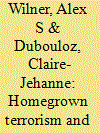

|
|
|
|
|
| Publication |
2010.
|
| Summary/Abstract |
Since 2001, a preponderance of terrorist activity in Europe, North America, and Australia, has involved radicalized Westerners inspired by al Qaeda. Described as 'homegrown terrorism', perpetrators are citizens and residents born, raised, and educated within the countries they attack. While most scholars and policy-makers agree that radicalization plays a central role in persuading Westerners to embrace terrorism, little research properly investigates the internal and cognitive processes inherent to radicalization. Transformative learning theory, developed from the sciences in education, health, and rehabilitation, provides an unconventional and interdisciplinary way to understand the radicalization process. The theory suggests that sustained behavioural change can occur when critical reflection and the development of novel personal belief systems are provoked by specific triggering factors. In applying transformative learning theory to homegrown terrorism, this study helps explain how formerly non-violent individuals come to condone, legitimize, and participate in violent behaviour.
|
|
|
|
|
|
|
|
|
|
|
|
|
|
|
|
| 3 |
ID:
095803
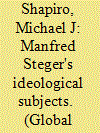

|
|
|
|
|
| Publication |
2010.
|
| Summary/Abstract |
I welcome the opportunity to be inspired and challenged by Manfred Steger's scholarship on ideology at the time of a rising global imaginary. My initial (and appreciative) response in this introduction is drawn from Gilles Deleuze's response to Michel Foucault's masterwork, Discipline and Punish, where he calls Foucault 'a new cartographer'. Drawing on his notion of the diagram, Deleuze suggests that Foucault has altered the topology within which power has traditionally been understood. To understand power, we can no longer 'accept a limited localization'.1 Rather, Foucault maps 'the concrete assemblages of school, workshops, army, etc.' along with 'finalized functions' that carry 'on right up to the state, which strives for global integration, at least in the form of a universalized Market place'.
|
|
|
|
|
|
|
|
|
|
|
|
|
|
|
|
| 4 |
ID:
095812
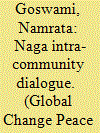

|
|
|
|
|
| Publication |
2010.
|
| Summary/Abstract |
The Naga intra-community dialogue is one of the most distinctive community-based dialogue processes in the world for the prevention, management and resolution of violent ethnic conflicts. Ongoing since the 1950s, the Naga dialogue has gained strong momentum since 2000 as a result of its growing capacity to address issues of violence and security in Naga-inhabited areas in India. The dialogue enjoys popular support as the formal ceasefire agreements between the Union Government and the Naga militant actors have failed to address issues of inter-factional violence and civilian deaths. The article argues that the Naga intra-community dialogue enjoys legitimacy in Naga society due to its representative character and visible impact in controlling the 'escalation' of violence in society. The article also argues that the formal Naga peace negotiations between the Government of India and the National Socialist Council of Nagalim-Isak-Muivah-NSCN (IM) will become more effective and inclusive in character if it is firmly rooted in the community based Naga dialogue.
|
|
|
|
|
|
|
|
|
|
|
|
|
|
|
|
| 5 |
ID:
095802


|
|
|
|
|
| Publication |
2010.
|
| Summary/Abstract |
Mongolian hip-hop artists import an American idiom, a commercialized cooptation of counter-hegemony, to voice nationalist opposition to Chinese regional imperialism - evoking the forbidden heritage of Genghis Khan from a previous wave of hegemony, and citing the transgressive influences of Michael Jackson and shamanic drumming. This is not your father's globalization. 'The old is fading away and the new is not yet born…
|
|
|
|
|
|
|
|
|
|
|
|
|
|
|
|
| 6 |
ID:
095805
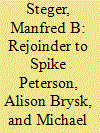

|
|
|
|
|
| Publication |
2010.
|
| Summary/Abstract |
I greatly appreciate the opportunity to offer a brief rejoinder to the three thought-provoking responses to my essay based on my recent study, The Rise of the Global Imaginary. Needless to say, each response contains a number of astute observations and cogent criticisms that will serve as useful catalysts for the further development of my ongoing work on the subjective and ideational dimensions of globalization. At the same time, however, I must also confess that I spotted a few passages in these responses that seem to have missed or misconstrued my arguments. Given the obvious spatial limitations of this rejoinder, however, I cannot cover all of these points. Rather, I am forced to take the rather selective approach of focusing on what strike me as the most crucial interventions while neglecting others that might be equally worthy of comment.
|
|
|
|
|
|
|
|
|
|
|
|
|
|
|
|
| 7 |
ID:
095810
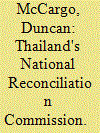

|
|
|
|
|
| Publication |
2010.
|
| Summary/Abstract |
This article examines the work of the National Reconciliation Commission (NRC) (2005-06), an independent body established by the government of Thailand to address a violent conflict in the country's southern border provinces. From the outset, the 50-member NRC chaired by former Prime Minister Anand Panyarachun was too large and unwieldy to function effectively. At the most basic level, there was a lack of trust and openness among the Commission's members which curtailed frank discussions. Because the political dimensions of the conflict were seen as off-limits, for a variety of cultural and historical reasons, the NRC produced a report that emphasized issues of justice, but failed to engage with the core questions underpinning the violence. Locating the NRC within an emerging global landscape of comparable 'truth commissions', the article argues that however well-intentioned, the Thai commission lacked clear goals, and was rather disappointing in its achievements.
|
|
|
|
|
|
|
|
|
|
|
|
|
|
|
|
| 8 |
ID:
095809
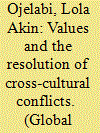

|
|
|
|
|
| Publication |
2010.
|
| Summary/Abstract |
The need to promote common goals, aspirations and shared values in the resolution of cross-cultural conflicts cannot be over-emphasized. Conflict resolution processes seek to find ways of satisfying the interests of all parties in conflict whilst promoting dialogue on issues that appear intractable. To achieve lasting outcomes, conflict resolution processes must assist in defining overarching needs, goals and interests. This article proposes that values of justice, freedom, equality, and peace are critical for cross-cultural conflict resolution and should be promoted through conflict resolution processes. Promoting values through conflict resolution processes will assist in creating overarching goals, needs and interests as well as producing lasting outcomes. In addition, promoting values will pave the way for addressing the root causes of cross-cultural conflicts.
|
|
|
|
|
|
|
|
|
|
|
|
|
|
|
|
| 9 |
ID:
095800
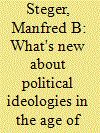

|
|
|
|
|
| Publication |
2010.
|
| Summary/Abstract |
The defeat of Nazi Germany in 1945 and the collapse of the Soviet Empire in 1991 enticed scores of Western commentators to relegate 'ideology' to the dustbin of history. Proclaiming a radically new era in human history, they argued that ideology had ended with the final triumph of liberal capitalism. This dream of a universal set of political ideas ruling the world came crashing down with the Twin Towers of the World Trade Center on 11 September 2001. Since then, influential political leaders have argued that the contest with jihadist Islamism represents much more than the military conflict. It is, as Presidents Bush and Obama put it, the 'decisive ideological struggle of our time'.1 Far from being moribund, then, competing political belief systems are alive and well in the early twenty-first century.
|
|
|
|
|
|
|
|
|
|
|
|
|
|
|
|
|
|
|
|
|